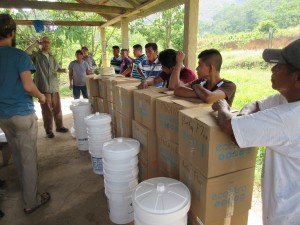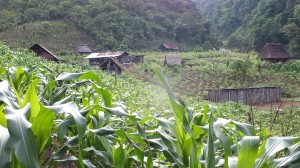Guatemala Solidarity Project
Solidarity Delegation Report, June 2015
Indigenous Rights Versus Terrorism and Environmental Destruction
From May 25 to June 4, a group of human rights activists from the United States, England and Colombia participated in a solidarity delegation organized by the Guatemala Solidarity Project. We were horrified to see that the government and capital interests are systematically using violence and judicial persecution to steal land from indigenous communities. Their goal is to exploit the natural resources and cheap labor of Guatemala, destroying rivers and local ecosystems in the process and leaving indigenous peasants with hunger and poverty.
We were inspired by the hopeful, creative and resilient organizing taking place in the communities we visited. We repeatedly met with people who are refusing to allow their lands to be stolen or their rivers and mountains to be destroyed.
Water sources polluted and depleted, hundreds of community leaders with arrest warrants on fraudulent charges, constant threats of government violence and frequent theft of lands is an unacceptable reality. The pillaging of Guatemala is feeding the insatiable greed of an extremely wealthy international minority. Capital interests are backed by military force, including training at the US Army School of the Americas and arms sales from Israel.
The international collaboration of military and capital elites can only be defeated if there is also international collaboration among people organizing for justice and peace.
We call for solidarity actions such as contacting the Guatemalan embassy and members of the US Congress and making tax-deductible contributions that go directly to support our partners in Guatemala.
The following are some of the organizations, communities and leaders who we spoke with during the delegation:
Madre Selva (Mother Jungle)
Guatemala City
The delegation received from this collective of ecologist activists a detailed political, economic and historical analysis of Guatemala’s shameful land and wealth distribution that excludes the poor, campesinos and workers, as well as information on communities in resistance to foreign corporations involved in displacing people from the land to impose mines and monoculture crops for export.
‘This country has not advanced even one millimeter since the US-organized coup against President Arbenz in 1954’
– Madre Selva organizer Julio González.
_________
Majawil Q’ij (New Dawn)
Guatemala City
Solidarity delegates learned about the efforts of this association of Mayan women to strengthen the participation of indigenous women in Guatemalan politics, rescue and revalorize Maya culture and resist violence against women in all its forms – including the authoritarian attempts by the state to impose policies that deepen the poverty and inequality that disproportionately affect women.
‘Machismo is not just a man’s attitude towards women – in Guatemala, machismo is a structural problem’
– Majawil O’ij activist Xun Ciin Ceto Morales.
_________
Comité de Unidad Campesina (CUC / the Committee of Peasant Unity)
Guatemala City
One of Guatemala’s largest and oldest peasant organizations gave the delegation a comprehensive summary of indigenous and peasant resistance struggles in the Verapaces, and detailed its work defending CUC organizers and activists targeted and threatened by wealthy landowners and corporations and jailed by the state.
‘Fighting for the redistribution of land is a constant struggle, but hope lies in the strength of peasants organized together’
– CUC Coordinador de Tierras José Alberto Domingo
___________
Saquimó Setaña
Coban, Alta Verapaz
Solidarity delegates met with indigenous peasants forced by a rich plantation owner to leave the land they purchased and worked for decades. They have suffered repeated threats, intimidation, violent attacks, extra-judicial eviction and the unjust imprisonment of several community leaders. The delegation later visited Pablo Sacrab Pop, a political prisoner from Saquimó Setaña, in the Coban jail.
Click here to sign the petition calling demanding justice for Saquimó Setaña
June, 2014 video on the disappearance of Saquimó Setaña (19 minutes):
‘Every one of us has the right to return to our land – this land is ours and we will return’
– Q’eqchi’ peasant activist Ana María Sacrab
____________
Timoteo Chen Tun
Coban prison
The delegation accompanied Monte Olivo political prisoner Timoteo Chen to a court hearing in Coban during which the magistrates once again called for another hearing even though Chen had already passed over a year in prison without evidence against him. The delegation later visited him in jail in solidarity with his fight against the clearly false charges the state has accused him of in an attempt to criminalize resistance to a private corporation’s violent imposition of an energy project that has displaced indigenous peasants in his community.
Click here to sign the petition demanding justice for Timoteo Chen Tun
‘We are not even for one moment going to accept this corporation in our community’
– Political prisoner Timoteo Chen Tun
____________
Consejo de Pueblos de Tezulutlán (Council of Tezulutlán Peoples)
Cobán, Alta Verapaz
The solidarity delegation received from CPT political activists a damning indictment of foreign corporations’ complicity in the Guatemalan state’s refusal to redistribute land to combat poverty and inequality.
‘Don’t take off my chains until my people are free’
– CPT activist Kajkoj Máximo Bá Tiul, quoting the Q’eqchi’ indigenous leader and independence activist Manuel Tot, demanding to be buried still tied in his prison chains just before he was assassinated by agents of the Spanish Empire in 1815.
____________
Paraná – community in resistance
Polochic, Alta Verapaz
The delegation made a seven hour journey to the heart of the Polochic to take the message that ‘you are not alone’ to this community of 40 Q’eqchi’ Maya families resisting the intimidation, threats, displacement and violence of the Chabil Utzaj sugarcane corporation, and to hear their story of organizing in the CUC. Paraná was violently evicted in 2011 and has faced numerous attacks by masked paramilitaries and private security, including the murder of community leader Maria Margarita Che Chub.
August 2011 interview with Paraná community leader shortly after attack by paramilitaries (6 minutes):
‘Your place is where you struggle, you have to fight for your place – we’re not leaving’
– Paraná community leader Mercedes Tupil
____________
San Miguel Cotoxja – community in resistance
Polochic, Alta Verapaz
CUC organizers brought representatives of the community’s 78 Q’eqchi’ Maya families together to tell the solidarity delegation the story of their 14 years of resistance to the Chabil Utzaj corporation, and of their fight to stay on their land. The government has supported violence and threats against the community so that the land can be used to produce biofuels instead of food for indigenous people.
Video from 2011 military and police attack against Q’eqchi’ peasant communities in the Polochic Valley:
‘We are expecting an attack at any moment, but we are organized to defend our territory’
– CUC organizer Carolina Rax
_____________
Panzós massacre commemorative march
Polochic, Alta Verapaz
The delegation participated – together with representatives from Paraná and San Miguel Cotoxja – in the march and blockade to commemorate the massacre in Panzós of dozens of indigenous Q’eqchi peasants during a demonstration in 1978. The peasants were killed by the military on behalf of wealthy landowners, but 37 years later, not a single soldier or “land owner” has been charged with responsibility for the murders.
‘We demand justice’
– Banner held high in Panzós
___________
8 de Agosto – community in resistance
Polochic, Alta Verapaz
On behalf of seven communities in resistance in the Polochic – Paraná, Río Frío, Bella Flor, 8 de agosto, San Miguel Cotoxja, Río Polochic II and Rodeo – the Guatemala Solidarity Project organized the delivery of ecologically friendly water filters and presented them to community leaders at the ‘Jacobo Arbenz Community Library’ in the CUC organized community of 8 de Agosto.
‘Clear head, fraternal heart and raised fist of the peasant workers!’
CUC slogan posted at the entrance to 8 de Agosto
____________
La Cumbre – community in resistance
Tactic, Alta Verapaz
High on a mountain above the clouds and under the red flag of the CUC peasant union, the delegation met with almost the entire community of 23 Q’eqchi’ families in La Cumbre to learn of their fight for land. Families had worked for generations on the plantation without receiving pay. When they organized in the 1990s to demand a salary, they were violently evicted. From 2008-2010 they met every week to organize a return to the land. On November 25, 2010, they reentered the land they were born on. Their basic rights still have not been recognized.
‘After we were displaced from the land, we met every night, and little by little we organized and united in the CUC until we were ready to take it back’
– CUC junta member José Caal Cho
_____________
Campesino and Workers’ meeting
Purulhá, Baja Verapaz
The delegation organized a meeting to record and document resistance to corporate takeovers of land in the pueblos of Ribaco and Panima, and to listen to the representatives of the Rincón San Valentín community in resistance. More information, including videos, of these and other delegation meetings will be released in the coming weeks.
‘All this is a fight over Mother Earth– and this struggle isn’t finished’
– Campesino leader Carlos Pérez Ja
_____________
Finca Rincón San Valentín – community in resistance
Purulhá, Baja Verapaz
Solidarity delegates learned of the more than 30 year fight to resist the attempts of four successive landowners to displace the people of this community. Before, these campesinos had to work unpaid as ‘mozos’ for finca owners just to gain the precarious ‘right’ to live in wood shacks with dirt floors, but now, these same families fight for their independence and endure threats, police raids and arrest warrants.
‘We want to tell our story and we want others to know it’
– Rincón San Valentín community leader Don Felipe
_____________
Río Cristalino – community in resistance
Cobán, Alta Verapaz
Delegates attended class in a school built by community members with support from the Guatemala Solidarity Project and, surrounded by 30 Q’eqchi’ Maya children, learned about the 10 year struggle to legalize the pueblo and gain recognition from the authorities of their right to live on this land.
‘We are still being denied the legal title to our land’
– Río Cristalino junta member Ignacio Paná Mucu
______________
Comunidad Indígena Santa María Xalapán I
Aldea La Laguna, Jalapa
The solidarity delegation were guests of honor at an indigenous Xinka political mass meeting – broadcast on Xinka radio and TV stations.
Solidarity work included recording reports of communities organizing and resisting mining corporations, the police and politicians, and meeting with Unidad Revolucionaria Nacional Guatemalteca candidate for mayor of Jalapa and Santa Maria Xalapán leader Roberto González Ucelo.
‘We have to take back what is already ours… we don’t want, nor do we need, gold and silver mines because we live from the land’
Xinka community member Delfino González Rosales
______________
Comunidad Indígena Santa María Xalapán II
Aldea La Fuente de la Montaña, Jalapa
Delegates learned from Xinka campesinos how the deeply spiritual and religious indigenous peoples in Santa María Xalapán cultivate the land with care and respect, but also how Jalapa politicians have abandoned Xinka pueblos, leaving them with tracks of dirt and rocks for roads, without medical supplies for their clinics and even failing to pay the wages of public workers.
‘The Gospel is not just what we have in the sacred writings… the Gospel is the rocks, the water, the land, the forests, the wind, the life of a human being, and the food are the main parts of the Gospel that we all have to defend.’
– Xinka community organizer Adelso Utelo
________________________











